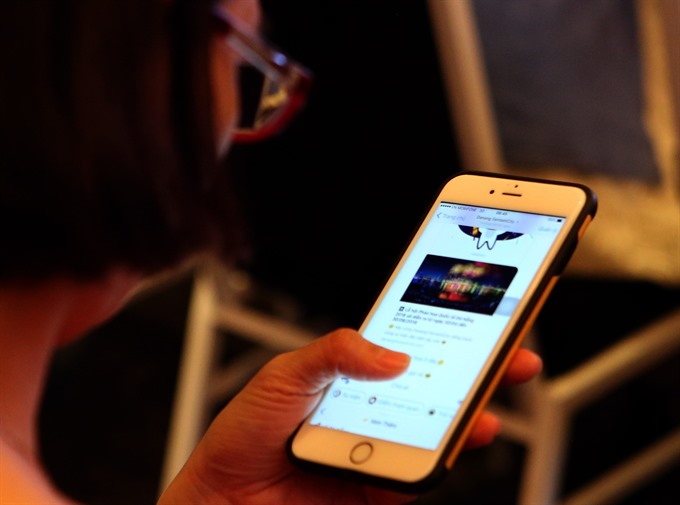The city's 3 musketeers of Viet chatbots
Since November 2017, visitors to Da Nang have been able to easily access to all tourism-related information via a smartphone-based app called Danang Fantasticity, which incorporates a smart chatbot.
 |
| Danang Fantasticity, one of Hekate’s chatbot products, helps to bring tourists closer to the city. — VNA/VNS Photo Tran Le Lam |
Danang Fantasticity was developed by Hekate, a technology start-up which grew out of the local business incubator named DNES.
Its co-founders, Nguyen Minh Duc, 27, Pham Quoc Huy, 27 and Duong Phuoc Thien, 25, became close friends at university. Together they left their former jobs, which were considered stable, to pour their heart and soul into developing chatbot applications.
A chatbot is an AI-based piece of software which is designed to simulate human’s conversational behaviour, and is used for different purposes, including customer service and information acquisition.
It was only in 2016, at a conference for Microsoft developers, that their technology was introduced.
“Microsoft CEO, Satya Nadella, said that chatbots are a combination of AI and smartphone users’ behaviour. The passion for innovation was then the main motivation to drive us forward, digging into this field,” Duc told ‘Tien Phong’ (Vanguard) newspaper.
Sumi, a chatbot running on Skype, a telecommunications application, was among their first products. The artificial assistant Sumi knows how to chat, troubleshoot and help users in many fields. Moreover, it is integrated with other applications including news or photo editing.
“On the first day launching our marketing forums, Sumi immediately went viral with 1,000 people starting conversation. Some even thought that it was a real person,” he added.
In April 2016, after Facebook’s CEO Mark Zuckerberg announced the integration of chatbot technology into the firm’s Messenger application, they decided to develop Sumi for the application and approached 40,000 users in just one month.
Counting both Skype and Messenger, until now, Sumi has interacted with more than a billion people around the world.
With such a bright start, at the end of 2016, they leaned further into the field with the establishment of Hekate, a company specialising in chatbot tech.
“Young people nowadays are interested in chatting online and using social networks. Therefore, we think chatbots will become a new development trend that startups all share. Furthermore, chatbots shows their outstanding advantages in providing quick and continuous responses to customer queries, as well as helping to reduce labour cost. Therefore, besides Sumi, we also offer different types of chatbot which can be flexibly used in business, services, finance and customer management,” Thien said.
Hekate’s products have been used at several local and international events to answer participants’ questions and demands. Hekate’s chatbot was chosen to be the tourism information app. This helped make Da Nang the second city in South East Asia, following Singapore, using chatbot technology in public services.
“Using Danang Fantasticity, tourists can access all information about the city, from weather and traffic to local hot spots, at their fingertips,” said Duc.
According to the Da Nang People’s Committee, in 2017, the city welcomed 6.7 million visitors, of which foreign tourists accounted for 34%.
At the time the application was piloted, there were 10,000 people from 12 countries using the chatbot. In April 2018, Danang Fantasticity became the city’s official tourism app.
Besides developing chatbots for business purposes, Hekate has demonstrated their desire to spread the values of this innovation by launching Messnow, a chatbot platform without coding, in June 2017.
Following some simple steps, anyone can create their own chatbot to answer messages automatically on Facebook Messenger.
“With this platform, one can create a chatbot in just five minutes. Messnow offers several templates for different business areas – hotels, restaurants or cafés for example,” Huy said.
After 6 months, 5,000 chatbots have been created using Messnow, reaching up to two million people.
“Compared with foreign-developed platforms, Messnow is friendlier to Vietnamese users. Furthermore, as it is multi-lingual with about 30 languages available at the moment and able to learn from conversations with customers, the more it interacts, the more natural its answers will be. We believe that Messnow can help enterprises answer all questions that their customers have,” said Duc.
(Source: VNS/ DA NANG Today)